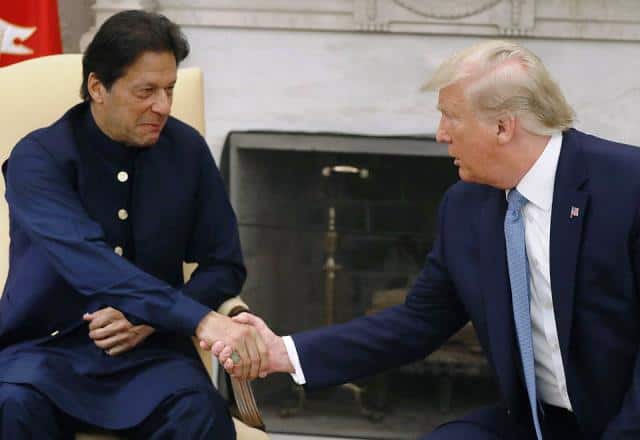
Trump Has Pushed India-Pak Dialogue Further Away
Pakistan Prime Minister Imran Khan’s first meeting with President Donald Trump was an unqualified success from Islamabad’s point of view. After raving and ranting against Pakistan’s perfidy, Trump was on a charm offensive when Khan arrived at the White House.
Will the rapprochement between the US and Pakistan change equations in South Asia, particularly its ties with India? Much will depend on how much Pakistan can influence the Taliban and whether a political deal materializes in Afghanistan. For now India has to wait and watch how the situation pans out.
Significantly, Pakistan’s Prime Minister was accompanied by both army chief General Qamar Javed Bajwa and ISI boss Faiz Hameed for the crucial meeting to reset ties. This perhaps to emphasise that the civilian and military leaders were on the same page and eager to stabilize Pakistan.
The talks centred round Afghanistan as Trump focused on getting Pakistan’s support for a peace deal to “extricate’’ American troops from that country. Trump’s one point agenda at the moment is to quit Afghanistan before Presidential elections next year, to notch up his election promise of ensuring that America is not the world’s policemen, nor is he interested in spreading democracy in far of regions. To do this, he wants Pakistan’s help and Islamabad will play its Afghan card to the hilt in getting Trump to endorse its position vise-a-vise India.
What was a diplomatic victory for Pakistan was mention of Kashmir. The US President declaring he was willing to act as mediator between India and Pakistan. To make things worse Trump said that Prime Minister Narendra Modi himself had asked him to do so. Hours later India refuted the US President’s claims. This was dismissed by those in the know as a usual Trump-speak with little to do with actual fact. No Indian Prime Minister, be it Modi or anyone else, will ever ask for third party intervention on Kashmir. Mediation is Pakistan’s calling card, not India’s.
The warm meeting at the White House and Trumps take on Kashmir is of some significance to India. For one, Delhi’s rhetoric on isolating Pakistan has come a cropper. Anyway, right from the start the wording was wrong. A country like Pakistan with a population of over 208 million, cannot be isolated from the world. What Delhi meant was that it would talk to the major world powers to show up Pakistan’s role as a terror hub. It was not a difficult task as the world was ready to be convinced.
The US and NATO allies had already experienced Pakistan’s double standards on terror in Afghanistan. At the time when the US and Pakistan were working closely to arm and train the Mujahideen to fight Russian occupation of Afghanistan, the US and its allies were stone deaf to Indian arguments on Pakistan based terror groups working against India in Kashmir and aiming to bleed India through these terror outfits. Is there a chance that the old narrative would occur again? Unlikely, as the Pakistan army has exposed itself blatantly in Afghanistan. But Trump can block all this out if necessary to get cooperation on the Taliban. And Islamabad knows that.
Afghanistan will be used smartly by Pakistan to get itself out of its current quagmire. Trump’s strategy is not long term. For the moment he is focused on getting his troops out of Afghanistan, and for that he is willing to play ball with Imran Khan. If Pakistan cannot deliver Trump may revert back to his old ways and blame Pakistan, but for now he will give Islamabad a long rope. Yet having had excellent ties in the past, and worked closely with the Pakistan army, many lawmakers in the US, especially the revived Pakistan Caucus in the US, believe that by withdrawing from that country, America has left a vacuum which is being filled by China. They would bat for more engagement.
Trump has little interest in Kashmir or charges of human rights abuse there. But he would be open to the idea of India and Pakistan resuming their stalled dialogue to reassure the GHQ in Rawalpindi,that they need not worry about India, but concentrate on getting the Taliban to talk to the Afghan government representatives. So there will be pressure for India and Pakistan to normalize ties. At the moment Narendra Modi will do little, as he would draw flak from the opposion as well as hardliners within his support base. The mediation request that Trump spoke of would be revived if he does so immediately.
But Modi is not averse to the idea of talks. He tried his hand at peace making during his first tenure. Delhi would like to wait and watch to see if Pakistan’s crack down on terror outfits is for real and not because of the fear of the Paris based Financial Action Task Force, placing the country on the black list. Pakistan’s case will come up for review in October. Few in India believe that Imran Khan could be in any position to make much of a difference. So Modi would be merely wasting his time and energy by engaging with Islamabad. Many within the RSS and BJP believe that the only way to deal with Pakistan is to strengthen India’s defences and hit back hard whenever a terror attack occurs. For the rest of the time, Pakistan can be ignored.
That is a limiting view. The world wants India to engage with Pakistan. Apart from the US, China, Saudi Arabia, UAE, Russia and the EU all want temperatures to come down between the two nuclear armed neighbours. A South Asia where India and Pakistan have normal ties, the region would be much more stable.
But even if talks are resumed, would it lead to any breakthrough? For the moment it is hard to imagine. Positions on either side are cast in stone on Kashmir. A blue print is actually already in place to initiate the process. President Pervez Musharraf was pragmatic enough to agree to the Loc becoming the border, better trade and connectivity between the two Kashmir’s and more people to people contacts would be a good way to begin. But before Musharraf could work on the formula, the lawyers agitation distracted him and the proposals were never seriously discussed afterwards. Successive Pakistani governments have thrashed the idea and Musharraf since being out of power has also disowned it.
Whether a final solution emerges or not, dialogue must be resumed. Firing across the LoC must stop. Civilians on both sides are sadly affected. India should not continue to oppose SAARC. It is not fair to the rest of the member states.
The government needs to focus on jobs and development if Modi’s ambitions of making India a five trillion dollar economy is to be achieved in the next few years. He and the entire country need to focus on the economy. That can happen only when the neighbourhood is at peace.



